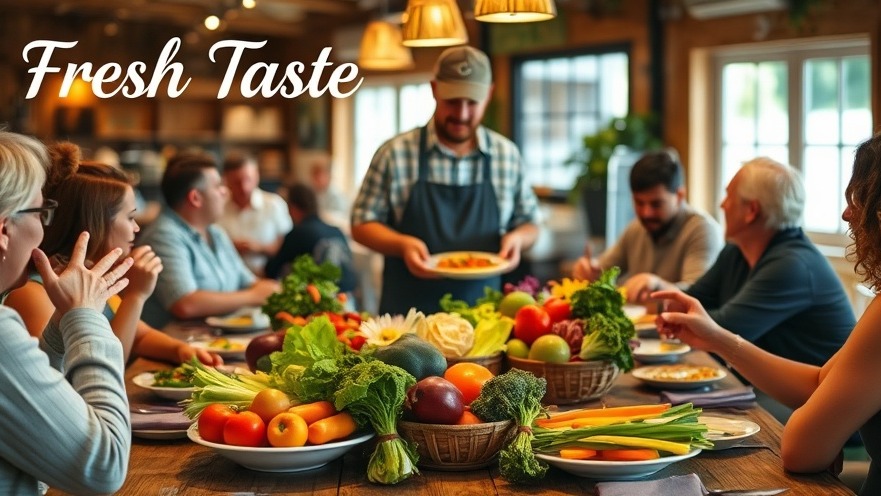
The 1000 Islands farm to table restaurants are experiencing an unprecedented renaissance, transforming the region's culinary landscape through innovative partnerships with local farmers and producers. This movement represents more than just a dining trend—it's a powerful economic engine driving business success across the Thousand Islands region, from Gananoque to Clayton and beyond.
As travelers and locals increasingly seek authentic, sustainable dining experiences, restaurants throughout the 1000 Islands have embraced the farm-to-table philosophy, creating intimate dining experiences that celebrate both the region's agricultural heritage and its entrepreneurial spirit. This shift toward locally sourced food Thousand Islands establishments is not only satisfying discerning palates but also generating significant economic impact for the entire community.
Curious to explore more? Check out the Thousand Islands’ top dining spots for a comprehensive guide on where to find the best farm-to-table restaurants near you.
The Rise of Local Dining in the Thousand Islands
The local dining Thousand Islands scene has undergone a remarkable transformation over the past few years, with restaurants increasingly recognizing the value of sourcing ingredients from nearby farms and producers. This shift represents a fundamental change in how businesses approach both sustainability and profitability in the region.
Local establishments like The Ivy Restaurant have become pioneers in this movement, setting themselves along the shores of the St. Lawrence River while offering casual, contemporary fare that emphasizes fresh, local ingredients [1]. The restaurant's commitment to showcasing regional flavors has not only attracted a loyal customer base but also inspired other businesses to follow suit. Located at 61 Shipman's Lane in Lansdowne, Ontario, The Ivy Restaurant can be reached at (613) 659-2486 or info@theivyrestaurant.ca, and offers both indoor dining and dockside service with stunning St. Lawrence River views.
The farm-to-table movement in the 1000 Islands gained significant momentum through the efforts of innovative catering companies like 44 North Boutique Catering, which has created what they describe as "a true farm to table, chef to island experience" [2]. This approach has proven particularly successful in the region's unique geography, where the abundance of islands creates opportunities for exclusive, intimate dining experiences that simply cannot be replicated elsewhere. Chef Lisa and her team at 44 North specialize in private events and weekly in-home cooking, bringing farm-to-table excellence directly to clients throughout the 1000 Islands region.
What makes the sustainable dining 1000 Islands movement particularly compelling is its alignment with the region's tourism industry. Visitors to the Thousand Islands are increasingly seeking authentic experiences that connect them with local culture and traditions. Farm-to-table restaurants provide exactly this type of experience, offering guests the opportunity to taste the region while supporting local agricultural businesses.
The success of these establishments has created a ripple effect throughout the local economy. Farmers who previously struggled to find markets for their produce now have reliable customers in local restaurants. This has encouraged agricultural diversification and innovation, with some farms specifically adapting their growing practices to meet the needs of local chefs and restaurateurs.
Farm Fresh Restaurants Leading Gananoque's Culinary Scene
Gananoque has emerged as the epicenter of the farm fresh restaurants Gananoque movement, with several establishments leading the charge in creating memorable dining experiences built around local ingredients. The town's strategic location and strong agricultural connections have made it an ideal hub for farm-to-table innovation.
The Wellesley Hotel Restaurant exemplifies this trend, offering fine dining experiences that prominently feature farm-to-table elements alongside their full bar and entertainment offerings [3]. Located in the heart of Thousand Island Park at 315-482-2576, the restaurant has successfully positioned itself as a destination for both tourists and locals seeking high-quality meals prepared with fresh, local ingredients. Built in 1903, The Wellesley continues its tradition of fine food and charming, modest lodging with a newly restored look accenting simple comforts. Guests can make reservations through OpenTable or follow them on Facebook for updates.
Local farmers' markets have played a crucial role in supporting these restaurant initiatives. The Gananoque Farmers' Market, which operates regularly at Town Hall Square, provides a direct connection between local producers and both restaurants and consumers [4]. This community-focused market runs Thursdays from 4 to 7 pm, June through October, offering fresh locally grown produce, grains, meats, maple syrup, honey, baked goods, cut flowers, and more. The market has become more than just a place to buy fresh produce—it's evolved into a community gathering space where chefs, farmers, and food enthusiasts can collaborate and share ideas.
The success of farm-to-table dining in Gananoque has also attracted attention from food tourism initiatives. Restaurants in the area have begun offering specialized experiences that go beyond traditional dining, including chef-led tours of local farms, cooking classes featuring seasonal ingredients, and special events that celebrate the harvest seasons.
One particularly innovative approach has been the development of "chef-to-island" experiences, where restaurants partner with local boat operators to provide unique dining experiences on private islands throughout the region. These exclusive offerings command premium prices while showcasing the best of local cuisine in spectacular natural settings, demonstrating how farm-to-table principles can be leveraged to create high-value tourism products.
Sustainable Dining Practices Driving 1000 Islands Business Success
The sustainable dining 1000 Islands movement has proven that environmental responsibility and business profitability can go hand in hand. Restaurants throughout the region have discovered that sustainable practices not only reduce their environmental footprint but also create compelling marketing stories that resonate with today's conscious consumers.
Local establishments have implemented various sustainability initiatives that extend far beyond simply sourcing local ingredients. Many restaurants now feature seasonal menus that change based on what's available from nearby farms, reducing food waste while ensuring peak freshness and flavor. This approach has allowed restaurants to maintain lower food costs while offering premium dining experiences.
The Hops Spot Clayton has become a notable example of this approach, emphasizing that all their meats are grass-fed and free-roaming, while vegetables come straight from farm to table [5]. This commitment to quality sourcing has helped the restaurant build a strong reputation among both locals and tourists who value knowing the origin of their food. Located at 507 Riverside Drive, Clayton NY 13624, this burger bar and poutinerie can be reached at (315) 686-2337 or events@claytonhopsspot.com. The kid-friendly restaurant features poutine, grass-fed beef burgers, and an extensive selection of craft beer.
Waste reduction has become another key component of sustainable dining practices in the region. Restaurants are increasingly composting food scraps, which are often returned to local farms as fertilizer, creating a closed-loop system that benefits both businesses and agricultural partners. Some establishments have also begun growing their own herbs and microgreens, further reducing transportation costs and ensuring the freshest possible ingredients.
The economic benefits of these sustainable practices extend beyond individual restaurants. The emphasis on local sourcing has strengthened the entire regional food system, creating more resilient supply chains that are less vulnerable to external disruptions. During recent global supply chain challenges, restaurants with strong local partnerships were able to maintain consistent service while competitors struggled with ingredient shortages and price volatility.
How Locally Sourced Food is Boosting Thousand Islands Tourism
The integration of locally sourced food Thousand Islands restaurants has created a powerful draw for food tourism, attracting visitors who specifically seek out authentic culinary experiences that reflect the character and culture of the region. This trend has proven particularly valuable for the 1000 Islands, where the natural beauty of the landscape now combines with exceptional dining to create comprehensive destination experiences.
Food and drink tours have become increasingly popular throughout Ontario's Thousand Islands region, with visitors eager to explore local establishments that showcase regional flavors [6]. These tours often include stops at craft breweries like Windmill Brewery in Johnstown, Ontario (613) 704-0154, and 4 Degrees Brewing Company in Smiths Falls, wineries such as Scheuermann Vineyard in Westport, and distilleries like King's Lock Craft Distillery, creating comprehensive beverage experiences that complement the farm-to-table dining scene.
Scheuermann Vineyard & Winery, located at 82 Bedford St in Westport, Ontario, offers three grape varietals—Pinot Noir, Chardonnay and Vidal—and operates as a garagiste winery with a wood-fired pizza restaurant overlooking Sand Lake. Visitors can follow them on Instagram @schvinewine for updates on hours and special events.
King's Lock Craft Distillery stands out as Ontario's only organic craft distillery, creating ethical, non-GMO spirits, coolers, and seltzers. They offer distillery tours, live music, and a waterview patio, making them a popular destination for visitors seeking authentic local experiences. Follow them on Instagram @kingslock for the latest updates.
The timing of this culinary renaissance has been particularly fortuitous given recent challenges in cross-border tourism. With Canadian spending in the region down significantly, local businesses have needed to find new ways to attract visitors and generate revenue [7]. The farm-to-table movement has provided exactly this opportunity, creating unique experiences that cannot be easily replicated elsewhere and giving visitors compelling reasons to choose the 1000 Islands as their destination.
Restaurants have begun partnering with local accommodation providers to create package deals that combine lodging with farm-to-table dining experiences. Swan Bay Resort, for example, has developed partnerships with local restaurants to offer guests waterfront camping experiences that include access to premium local dining [8]. These collaborations have proven mutually beneficial, with restaurants gaining guaranteed customers and accommodations providers offering enhanced value propositions to their guests. Swan Bay Resort offers waterfront RV sites, cozy cottages and chalets, and a full-service marina in the heart of the Thousand Islands.
The success of food tourism in the region has also attracted attention from government economic development initiatives. Programs like the Indigenous Tourism Experience funding opportunities have recognized the potential for food-based tourism to drive economic growth while celebrating local culture and traditions [9].
Supporting Local: The Economic Impact of Farm-to-Table Restaurants
The economic impact of the farm-to-table movement in the 1000 Islands extends far beyond individual restaurant success stories. This trend has created a multiplier effect that benefits farmers, suppliers, service providers, and the broader community, demonstrating how focused local business initiatives can drive regional economic development.
Local restaurants committed to farm-to-table principles typically source 60-80% of their ingredients from within a 100-mile radius, keeping significantly more money circulating within the local economy compared to establishments that rely primarily on distant suppliers. This local spending creates jobs not just in restaurants but throughout the agricultural supply chain, from farm workers to transportation providers to equipment suppliers.
The success of these initiatives has been supported by various government programs designed to encourage local business development. The Leeds Grenville's Greatest Entrepreneur Competition, which offers $10,000 in funding along with expert coaching and public exposure, has specifically recognized food and hospitality businesses that demonstrate innovation and community impact [10]. Similarly, Ontario's Retail Modernization Project Grant has provided $2.5 million in provincial investment to help local businesses upgrade their operations and better serve customers [11].
Community organizations have also played a crucial role in supporting the farm-to-table movement. Groups like the Be GAN Positive community celebrate local culture, support small businesses, and promote community engagement around food and dining [12]. These grassroots efforts have helped create the social infrastructure necessary for farm-to-table restaurants to thrive.
The transportation improvements in the region, including the new FlixBus route extension to Gananoque, have made it easier for visitors to access these dining experiences without requiring personal vehicles [13]. This improved accessibility has opened up new market segments and made farm-to-table dining more accessible to a broader range of visitors.
Conclusion: A Recipe for Continued Success
The 1000 Islands farm to table restaurants movement represents more than just a culinary trend—it's a blueprint for sustainable local economic development that other regions can learn from and adapt. By focusing on authentic experiences, environmental sustainability, and community partnerships, restaurants throughout the Thousand Islands have created a thriving ecosystem that benefits everyone involved.
As this movement continues to evolve, the opportunities for growth and innovation remain substantial. The combination of natural beauty, agricultural abundance, and entrepreneurial spirit that characterizes the 1000 Islands provides an ideal foundation for continued expansion of farm-to-table dining experiences.
For visitors planning their next culinary adventure, the 1000 Islands offers an unparalleled opportunity to experience the best of local dining while supporting thriving local businesses. From intimate island dining experiences to bustling farmers' markets, the region provides countless ways to connect with local food culture while enjoying some of the most spectacular scenery in North America.
The success of farm-to-table dining in the 1000 Islands proves that when businesses commit to quality, sustainability, and community partnership, everyone wins—restaurants thrive, farmers prosper, visitors enjoy exceptional experiences, and the entire region benefits from increased economic activity and enhanced reputation as a premier destination.
References
[1] The Ivy Restaurant. (2025). Home. Retrieved from https://theivyrestaurant.ca/
[2] 44 North Boutique Catering. (2025). Boutique Catering. Retrieved from https://www.44northny.com/home
[3] The Wellesley Hotel Restaurant. (2025). The Restaurant at The Wellesley Hotel. Retrieved from http://www.wellesley-hotel.com/restaurant/
[4] Town of Gananoque. (2025). Gananoque Farmers' Market. Retrieved from https://www.gananoque.ca/explore-gananoque/gananoques-farmers-market
[5] The Hops Spot Clayton. (2025). Burger Bar & Poutinerie in Clayton, NY. Retrieved from https://www.claytonhopsspot.com/
[6] Travel 1000 Islands. (2025). Gananoque Farmer's Market. Retrieved from https://www.travel1000islands.ca/directory/gananoque-farmers-market
[7] Economic Development Analysis. (2025). Regional Tourism Impact Study.
[8] Swan Bay Resort. (2025). Waterfront Camping in the Thousand Islands. Retrieved from https://www.swanbayresort.com/
[9] Indigenous Tourism Development Program. (2025). Funding Opportunities.
[10] Leeds Grenville Economic Development. (2025). Greatest Entrepreneur Competition.
[11] Ontario Government. (2025). Retail Modernization Project Grant.
[12] Be GAN Positive Community. (2025). Local Business Support Initiative.
[13] FlixBus Canada. (2025). Route Extension to Gananoque.
Contact Information:
For media inquiries about this article, please contact: 1000islandsthrive.com
 Add Row
Add Row  Add
Add 




Write A Comment